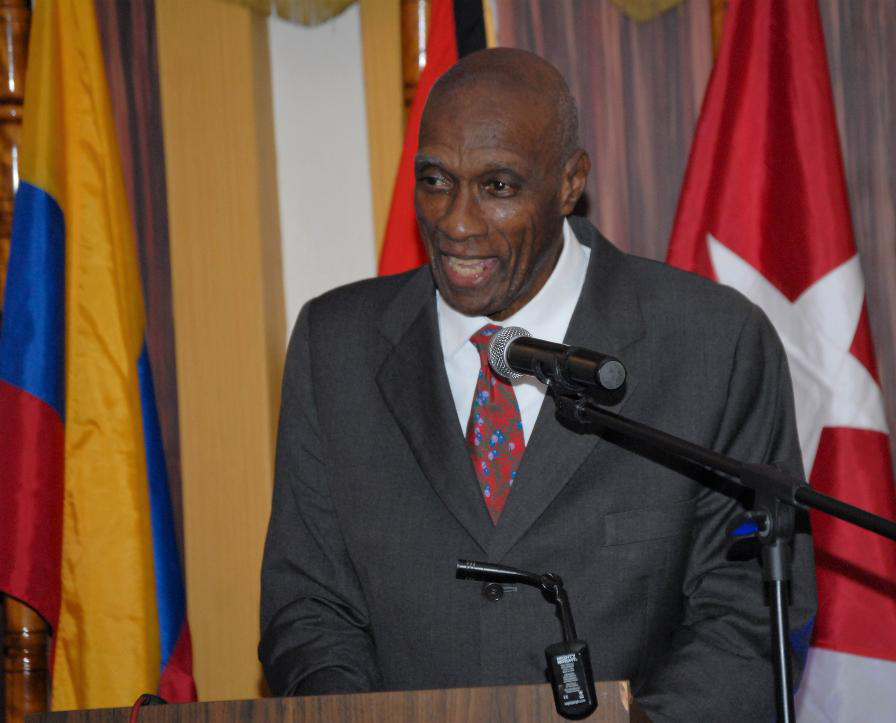Sir Wesley Hall, the former star West Indies fast bowler of the 1960s, was a star again Friday night as he gave a heartfelt recollection of his life, both on and off the field, at the Rotary Club of Georgetown Dinner at the Le Meridien, Pegasus Hotel, Kingston.
Giving the feature address, the now 80-year-old former tear away fast bowler from Barbados took to the podium in front of a packed hall and refused a chair, opting to stand and deliver, which is what he did for most of his a little over a decade-long career.
“There is no greater gift than playing for West Indies,” said Hall, who
Played 48 test matches in a career spanning 1958-1969.
In his speech that lasted 75 minutes, the iconic cricketer reminisced on his boyhood days. The giant of a man, then a little boy, would run around the community of St Michael telling everyone he would go to Combermere School and play for the West Indies. He recalled that everyone would say this little boy was crazy but by the age of 19, Sir Wes Hall had accomplished two of his life’s goals.
In an emotional speech, Hall spoke of how he became the deadly pacer with the stamina of a beast, and offered advice to the many ears which listened intently.
Born in 1937, Hall recalled growing up knowing about England’s history and not West Indian history and recalled how West Indian cricket had its part to play in the “Independence of our people.
“Cricket had a great influence on Independence. I want to tell you that in 1960, while we were in Australia, CLR James wrote to the captain, Sir Frank Worrell and he said `I want you to know that if your men play well on this tour when you recognize that the federation is on its last legs, and if you fellas play well enough, this will take the impetus to the West Indian people to know that they can always be independent.’
“Ladies and gentlemen, in 1966, Barbados and Guyana gained their Independence.”
Hall spoke of the struggles in life and told those in the audience to never doubt themselves.
He recalls being a fast bowler without ever being coached and remembers that it was at his High School that he picked up wicket keeping after receiving a book titled `Behind the Stumps.’
Upon receiving the book he was told that he could bat after scoring runs at the junior level but could not bowl nor field.
With the promise of making the team if he could learn to keep wicket, a young Hall had set out to do well reading the book and making his way into the team.
However, it was not an easy task as he did his research and realized wicket keeping was tough as the West Indies had played six ‘keepers in five years so he said to himself `Well look I finish with that idea of playing for the West Indies.’
He went to work at Cable and Wireless and was keeping wicket when the captain said, “Wes you are a big guy I want you to take off the pads and bowl,” but Sir Wes responded with “I wouldn’t like that sir.”
He, nevertheless, went to take the shine off the ball and returned figures of 7-25. It was after that he was told to go to England to play as a fast bowler and was invited down to the Wanderers where he impressed and was offered a spot to play against Swansea XI. Without any experience in setting a field, the energetic Hall was battered to 120- odd runs and took no wicket.
He made his way to England to play but returned with 27 wickets in six months as the talk of the community was that “he would not make it to the West Indies team even if he lives to be 100 years old.”
A deflated Sir Wes added that it was his mother who motivated him reminding him that only he who can make him a failure as he dug deep “ran 10 miles a day and bowled at one stump four days a week,” until he thought he was fit and ready.
He became the first West Indies bowler to claim an international hat-trick and by the next three years had 100 test wickets. Also, remarkably at the end of 1963 he had 163 test wickets, the record at the time.
Hall said he thought he would be a millionaire having a good education coupled with playing for West Indies, but the players received only one pound a day. While little, it was four times what he made at Cable and Wireless.
At the end of an illustrious career, Sir Wes had 192 wickets from 48 matches at an average of 26.38.
According to him, while his best figures of 7-69 at Sabina Park, Kingston, Jamaica, the best innings to him was at Bourda, Georgetown Guyana where he had 6-90 stating that on Bourda, six fast bowling wickets was a feat as compared to Jamaica where the wicket is suited for fast bowling.
Following the end of his memorable career, Sir Wes was also Chairman of Selectors, West Indies Manager, President of the West Indies Cricket Board as well as part of the board of the Stanford Cricket panel.
Because of his influence in the game, and service to West Indies cricket Sir Wes was awarded the knighthood on the Queen’s birthday honor list in 2012 and introduced to the West Indies Hall of Fame in 2015.






